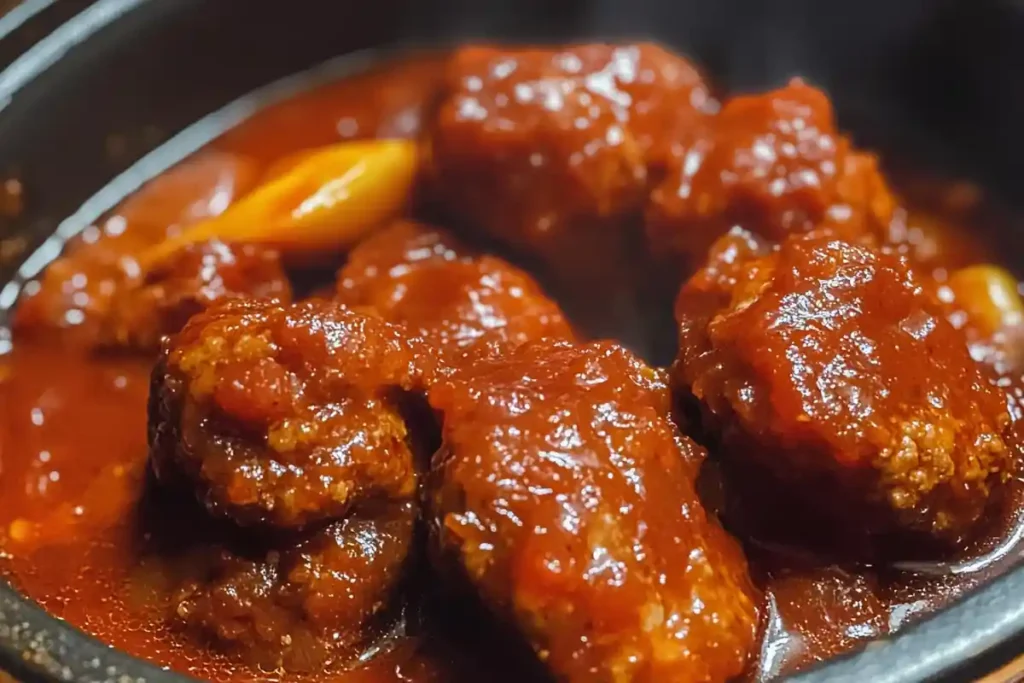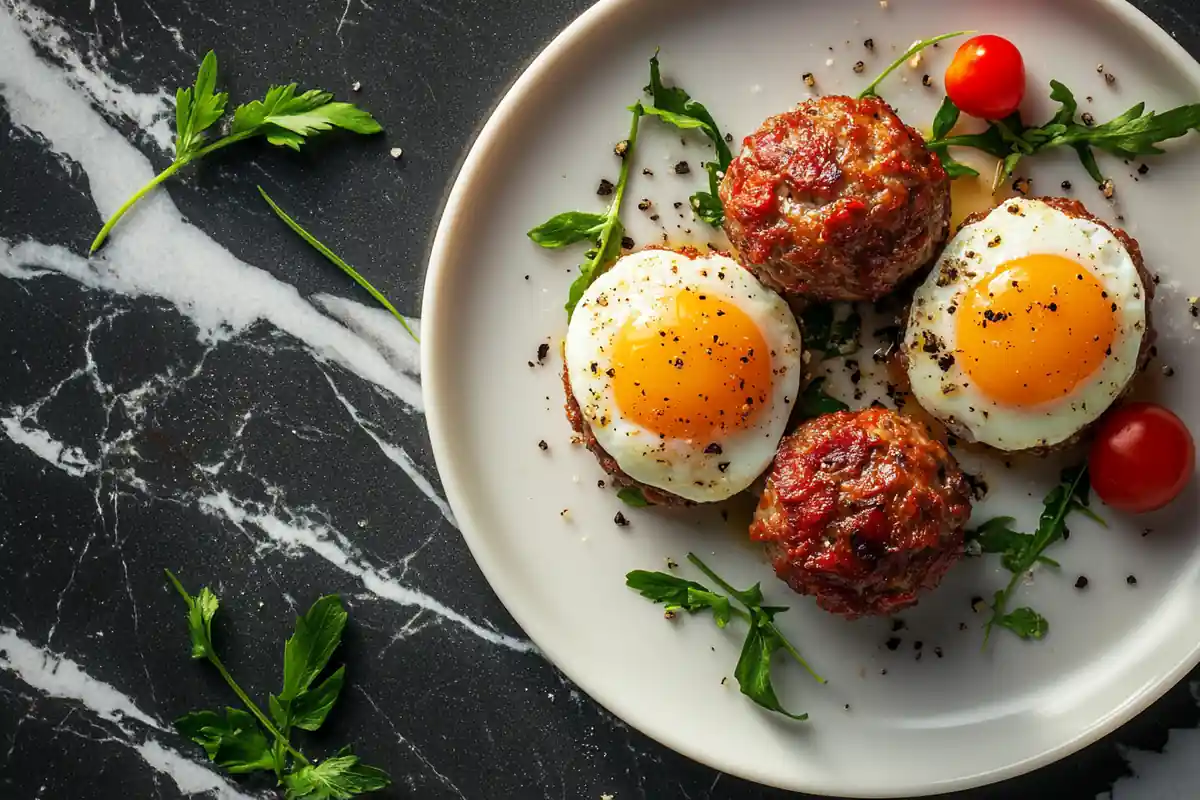Why use eggs when you make meatballs? This guide explores the role of eggs in making the most delicious and perfectly textured meatballs.
Table of contents
- Why Add Eggs When Making Meatballs?: The Secret Ingredient
- The Science Behind Adding Eggs to Meatballs
- What Happens If You Skip the Egg When Making Meatballs?
- Egg Yolks vs. Egg Whites: Their Different Roles in Meatballs
- Step-by-Step Guide to Using Eggs in Meatballs
- Alternatives to Using Eggs in Meatballs
- Other Tips for Perfect Meatballs (Beyond Using Eggs)
- Conclusion: The Importance of Eggs When Making Meatballs
- Frequently Asked Questions (FAQs)
Why Add Eggs When Making Meatballs?: The Secret Ingredient
Making meatballs can seem simple. However, achieving the perfect texture and taste requires a bit of know-how. Why would you add eggs when making meatballs? It’s a question many home cooks ask. Eggs, often overlooked, are actually vital to a great meatball. They act as a binder. This means that they help hold all the ingredients together. In addition, eggs add moisture. Thus, the result is tender, not dry, meatballs.
Binding Ingredients with Eggs
Meatballs need something to keep them from falling apart. Eggs are the answer. Their proteins bind the meat and other components into a cohesive mixture. This process is similar to making a cake. In both, the eggs give structure. When cooking, these proteins set. They create a stable and firm meatball. Without them, meatballs would be crumbly and would fall apart easily.
How Eggs Add Moisture to Meatballs
No one likes a dry meatball. Eggs play a key role in preventing this. The yolk contains fat. This adds richness. The white has water. This keeps the meatball moist during cooking. This moisture helps to keep the texture soft. Moreover, it keeps the meatballs juicy and easy to eat.
The Science Behind Adding Eggs to Meatballs
The magic of eggs in meatballs isn’t just about taste. There is also a scientific reason why you might add eggs when making meatballs. The proteins found in eggs are vital. They undergo a process called coagulation when heated. This process is what causes the mixture to bind together. It’s not just about keeping things together though. The coagulated proteins also give a great texture to the finished meatball. They make them firm, but still tender.
Protein Coagulation in Meatball Making
When you mix eggs with other ingredients, the proteins in them begin to unwind. When heat is applied during cooking, these unwound proteins form new bonds. This transformation traps moisture within the meatball. The outcome is a stable, juicy, and cohesive product. This science is important to understand, so you can appreciate why eggs are a necessity in meatball recipes.
Why Eggs Help Achieve the Perfect Meatball Texture
The balance of moisture and protein from eggs is what leads to the perfect meatball texture. The right amount of egg means your meatballs won’t be too dense or too loose. Furthermore, understanding the scientific aspect of eggs helps cooks achieve consistency in every batch of meatballs. They also maintain a good shape throughout the cooking process.
What Happens If You Skip the Egg When Making Meatballs?
What if you decide to skip the eggs when you make your meatballs? If you don’t put an egg in meatballs, there is a high chance that they will fall apart. Without that binder, the other ingredients do not stick together correctly. Therefore, the meatballs will likely become dry and crumbly. In addition to texture, you’ll also notice a difference in taste. The richness that egg yolks add is missing.
Problems with Egg-Free Meatballs
Meatballs without eggs can lack both flavor and structure. They can often end up being too dry. As a result, they are less enjoyable. Additionally, they are harder to work with. They tend to crumble when you shape them. They may even break apart while cooking.
Using Egg Alternatives for Meatballs
Despite the benefits, some people cannot eat eggs. This could be due to allergies or personal preference. There are some alternatives available. However, these might not provide the exact same effect as a real egg. For example, some use flaxseed meal or breadcrumbs as binders. These alternatives can work. But you might need to adjust the other ingredients in your recipe to get the desired consistency. It is also important to remember that the result will not be exactly the same.
Egg Yolks vs. Egg Whites: Their Different Roles in Meatballs
Eggs are not a single component. They have different parts that each contribute something to meatballs. The yolk and white have different qualities. Each serves a unique purpose in cooking. Therefore, understanding their differences is important for making the best meatballs.
The Contribution of Egg Yolks to Meatballs
The egg yolk is where the fat and richness reside. It’s also where a lot of the flavor comes from. It adds a luxurious mouthfeel to meatballs. It makes them moist and tender. Also, the fat in the yolk is essential. It ensures the meatballs don’t dry out while cooking.
The Role of Egg Whites in Binding
On the other hand, egg whites mainly add moisture and binding. The proteins in the white are what coagulate when heated. They help hold the meatball together. This creates a firm texture. Using both yolk and white is great because it balances flavor and structure.
How to Balance Yolks and Whites in Meatballs
A recipe usually calls for a whole egg. Using both yolk and white is best for most meatball recipes. This provides the right balance of binding, moisture, and taste. However, some recipes might call for extra yolk or white. This is usually to achieve a specific texture. For example, using an extra yolk can result in a richer taste. Adding more whites can give a firmer result.
Step-by-Step Guide to Using Eggs in Meatballs

Mixing meatball ingredients with an egg.
Now that you know why eggs are so important, here’s how to use them in your meatball recipe. First, prepare all your ingredients. This includes your ground meat, breadcrumbs, seasoning, and, of course, your egg.
Tips for Preparing Meatballs with Eggs
- Make sure your egg is fresh. Fresh eggs bind better than older ones.
- Lightly whisk your egg before adding it to the mix. This ensures it’s evenly distributed.
- Do not overmix the meatball mixture. Overmixing will make the meatballs tough.
How to Properly Mix Meatballs with Eggs
- In a large bowl, combine your ground meat, breadcrumbs, and seasoning.
- Make a well in the center of the mixture.
- Pour the whisked egg into the well.
- Gently mix everything together using your hands or a fork. Mix until all the ingredients are just combined.
- Shape the mixture into meatballs.
Cooking Meatballs to Perfection
- Cook your meatballs in the method of your preference. This could be baking, frying, or simmering in sauce.
- Make sure the meatballs reach an internal temperature of 165°F. This ensures they are cooked safely.
- The use of eggs will ensure your meatballs keep their shape while cooking.
Alternatives to Using Eggs in Meatballs
Although eggs are ideal for binding meatballs, not everyone can use them. There are variations for those who have allergies or specific diets. These variations can provide a similar binding effect. Accordingly, they are good options when eggs are not an option.
Popular Egg Substitutes for Meatballs
- Breadcrumbs or Oatmeal: These can absorb moisture and act as a binder. But you need to add extra moisture to the mix. This is often in the form of milk or water.
- Flaxseed Meal: When mixed with water, flaxseed meal forms a gel. This can help bind ingredients. But it can change the taste a bit.
- Chia Seeds: Similar to flaxseed, chia seeds also gel when mixed with water. Furthermore, they provide a similar binding function.
- Mashed Potatoes: These can add moisture and act as a binder. However, they can also add a slight sweetness.
- Tofu: Pureed tofu can be used as a binding agent in meatballs. Indeed, it also provides a bit of protein.
Adjusting Recipes When Using Egg Substitutes in Meatballs
When using these substitutes, you need to adjust the other ingredients. For example, if you’re using breadcrumbs or oatmeal, you’ll need extra liquid. Similarly, flaxseed or chia seeds need time to gel. You also need to consider how these will affect the final taste and texture of your meatballs. Therefore, start by adding substitutes in small quantities. Then adjust as needed.
Other Tips for Perfect Meatballs (Beyond Using Eggs)
Besides using eggs, some other things can help you make the best meatballs. These are about the types of meat, handling, and cooking. In addition, they enhance the flavor and texture of your dish.
Choosing the Right Meat for Your Meatballs
The type of meat you choose is important. A blend of ground beef, pork, and veal is common for meatballs. This mix gives a good balance of flavor and fat. However, you can use any kind of meat you like. This includes turkey, chicken, or lamb.
The Importance of Handling Meatballs
Do not overwork your meatball mix. Overmixing will cause the proteins to toughen. This will result in dense and rubbery meatballs. Handle your mix gently. Combine the ingredients just enough to hold together.
Cooking Methods for Meatballs
- Baking: Bake your meatballs for a less greasy approach. This will give a more even cooking.
- Frying: This method offers a crispy exterior. But it also requires careful attention to the cooking heat.
- Simmering: Cooking them directly in your sauce keeps the meatballs moist. It also infuses them with flavor.
Conclusion: The Importance of Eggs When Making Meatballs

Delicious meatballs after being cooked in sauce.
In conclusion, why would you add eggs when making meatballs? The answer is clear. Eggs are more than just another ingredient. They are essential. They act as binders. They add moisture. They also contribute to the ideal texture and flavor of meatballs. Eggs help your meatballs stay together and are also the reason that they’re juicy. While there are alternatives, eggs give the best results. Specifically, they provide a unique balance of binding and texture that is hard to match. Accordingly, adding eggs to your meatball recipe is a key step in creating delicious, restaurant-quality meatballs at home.
Frequently Asked Questions (FAQs)
Eggs are essential in meatballs. They act as a binding agent to hold all the ingredients together. They also add moisture and richness. This results in a tender and flavorful meatball that doesn’t fall apart while cooking. The proteins in eggs give structure.
If you don’t add an egg to your meatballs, they will likely crumble and fall apart. Moreover, they will lack the moisture and tenderness that eggs provide. The result will be dry and less flavorful meatballs. They may also be harder to handle during cooking.
While there are alternatives like breadcrumbs or flaxseed, eggs are considered the best binding agent. They provide both structure and moisture. Furthermore, they contribute to the overall texture and richness of the meatballs.
Egg yolk adds richness and moisture. It also enhances the flavor. In meatball recipes, it helps to keep the meatballs tender and juicy. This creates a more delicious eating experience.

